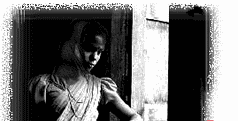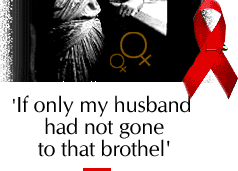|
|
|
||
| HOME | NEWS | SPECIALS | |||
|
December 1, 2001
NEWSLINKS
|
|
The Rediff Special/Shobha Warrier
 
"When I was a young girl I dreamt of having a happy family. I dreamt of having kids. I wanted to marry, have children, and shower them with love."
Kausalya got married all right. When she was 19, to a relative.
That was in 1995. A few weeks later her husband tested positive for AIDS.
All she knew about the disease at that point was that "it was dirty, and anyone who caught it would die".
"It was very cruel of him to marry me because he was tested positive before," she said. "The doctors had asked him not to marry, but he did not pay heed."
Seven months on, Kausalya's husband died, leaving her HIV-positive. "All my dreams were shattered," she said. "I could only wait for death."
Time erased her tears, only to replace them with a dull sense of despair. She contemplated suicide. But friends persuaded her not to take her life.
Then, slowly, she began wanting to live again. To fight AIDS. And the best way to do that, she felt, was to educate people, especially girls like her, about the disease.
"I talked about what had happened to me," she said. "I advised all girls to ask for a blood test report from the person she was going to marry. Otherwise my fate awaits you, I told them."
Kausalya's efforts caught media attention. She was interviewed, she appeared on television. And everywhere she had the same message: prevent AIDS, there is no way you can outlive it.
The young girl also made it a point to visit the HIV-positive women in her hometown Namakkal. She wanted them to join her crusade. But they weren't ready to acknowledge their status in public.
Kausalya then moved to Madras with her family. That proved to be a turning point in her life.
She became part of INP Plus -- the Indian Network of People Living With HIV/AIDS, a non-governmental organisation -- and began helping other women.
INP Plus helped her start the first organisation for AIDS-afflicted women in south India, the Positive Women's Network.
Eighteen women attended its first meeting. They spoke of their troubles and fears. The interaction helped them to look at life positively. Today PWN has 200 members.
"Most of our members are housewives," said Kausalya. "We tell them to go out and seek employment. If they sit at home they will brood about their troubles.
"Widows have the worst deal. They have to look after the children and provide for their education. It is very difficult to do this when you are sick too."
The PWN meetings now feature doctors, dieticians and social workers, who address the issues the members raise. It also provides counselling and social support.
Padmaja's husband was a bank clerk. The first two years of her wedded life were bliss. Then her husband began having recurrent skin problems and fever. He lost weight, coughed all the time.
The doctors found him to be an AIDS patient. Padmaja and their younger daughter, just 12 months, too tested positive.
"Our own relatives shunned us," Padmaja recollected. "Our brothers and sisters avoided us. They feared they would contract the disease. We were reduced to untouchables."
She began working with the PWN when the medical costs became too much for her husband to bear alone.
"We needed the money. I also needed to forget the painful realities of life," she said. "Now that I work here, I have access to a lot more information on HIV, AIDS and medicines. The support group meetings make me happy. Sharing the sorrow alleviates the pain."
Padmaja's main concern now is her five-year-old daughter, who is HIV-negative. "Our days are numbered, but what of our poor daughter?" she wondered. "I cry when I think of what will become of her.
"There are a lot of 'ifs' in my life. If only my husband had not gone to that brothel in Bombay. If only he had not contracted the disease. If only he had not passed it on to us. If only our daughters were not born...
"Life was hell till I joined PWN," she added. "It's only now that I've started living."
Yes. Were it not for organisations like the PWN, Kausalya and Padmaja, and thousands like them, would have surrendered to AIDS without a fight.
"I thought I would not be able dream again, but I do have dreams now," Kausalya said. "I dream of helping the unhappy. People should know everything about the HIV virus. I want to make everyone aware of the disease so that nobody will get this virus in future!
"As a teenager, there was only me in my dreams. But today at the age of 24, I see many people."
ALSO SEE:
Fight AIDS: Ten sites for information on prevention and treatment
|
|
|
Tell us what you think of this special report
|
|
|
HOME |
NEWS |
CRICKET |
MONEY |
SPORTS |
MOVIES |
CHAT |
BROADBAND |
TRAVEL ASTROLOGY | NEWSLINKS | BOOK SHOP | MUSIC SHOP | GIFT SHOP | HOTEL BOOKINGS AIR/RAIL | WEDDING | ROMANCE | WEATHER | WOMEN | E-CARDS | SEARCH HOMEPAGES | FREE MESSENGER | FREE EMAIL | CONTESTS | FEEDBACK |
|